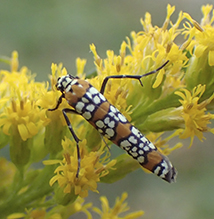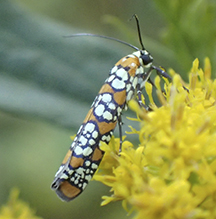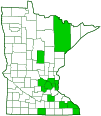ailanthus webworm moth
(Atteva aurea)
Conservation • Description • Habitat • Ecology • Distribution • Taxonomy
|
||||||||
| Hodges # | 2401 |
|||||||
Conservation Status |
||||||||
| IUCN Red List | not listed |
|||||||
| NatureServe | NNR - Unranked SNR - Unranked |
|||||||
| Minnesota | not listed |
|||||||
Description |
||
Ailanthus webworm moth is a small, native, ermine moth with a colorful appearance and an unusual history. It was formerly native to the tropical Americas, including southern Florida, Central America, and the Caribbean, where its larval hosts were paradise tree (Simarouba glauca) and Simarouba amara. In 1784, the Chinese tree of heaven (Ailanthus altissima) was introduced into Philadelphia. The tree was fast growing and spread quickly. When it reached Florida in the 1850s, ailanthus webworm moth found it to be an acceptable host. The moths then began moving north to wherever their new host was found. Ailanthus webworm now occurs throughout the United States east of the Great Plains, and in southern Quebec and Ontario Canada. It is common in the eastern United States, uncommon but increasing in Minnesota. Tree of heaven, which is often planted as an ornamental in urban areas, remains the primary larval host, but larvae have also been found on avocado, Emory’s crucifixion-thorn, and sumac. Adults are found visiting flowers from May to October in Minnesota. They can’t survive northern winters, but they recolonize the northern range of tree of heaven every year. Although its range has recently expanded greatly, ailanthus webworm moth is not considered invasive by any state or province. Adults are 7⁄16″ to ⅝″ (11 to 15 mm) in length and have a 11⁄16″ to 1 3⁄16″ (18 to 30 mm) wingspan. The forewings are reddish-orange with four broad black bands filled with white or pale yellow spots of varying size. The bright pattern is thought to be a warning to predators of their unpalatability. The black areas have bluish-purple reflections. The hindwings are mostly translucent with black on the margins and black veins. |
||
Size |
||
Total length: 7⁄16″ to ⅝″ (11 to 15 mm) Wingspan: 11⁄16″ to 1 3⁄16″ (18 to 30 mm) |
||
Similar Species |
||
Ornate moth (Utetheisa ornatrix) is superficially similar but larger. The forewings are crossed with rows of black spots bordered with white. |
||
Habitat |
||
|
||
Ecology |
||
Season |
||
Several generations per year: May to October in Minnesota |
||
Behavior |
||
The larvae create a shelter of a bundle of leaves secured with silk and feed communally inside the shelter. Adults are active during the day. |
||
Life Cycle |
||
Development from the egg to an egg-laying adult is just four weeks. Larvae pupate within their feeding shelter. Female adults deposit eggs one at a time on the same or on another shelter. One shelter may contain larvae of multiple generations. |
||
Larva Hosts |
||
Tree of heaven, avocado, Emory’s crucifixion-thorn, and sumac |
||
Adult Food |
||
Flower nectar |
||
Distribution |
||||
|
Sources Biodiversity occurrence data published by: Minnesota Biodiversity Atlas (accessed through the Minnesota Biodiversity Atlas Portal, bellatlas.umn.edu, 5/19/2023). |
|||
| 5/19/2023 | ||||
Nativity |
||||
Although its range has recently expanded greatly, ailanthus webworm moth is not considered invasive by any state or province. |
||||
Occurrence |
||||
Common in the eastern United States, uncommon but increasing in Minnesota. |
||||
Taxonomy |
|||
Order |
Lepidoptera (Butterflies and Moths) | ||
Superfamily |
Yponomeutoidea (ermine moths and allies) | ||
Family |
Attevidae (tropical ermine moths) | ||
Genus |
Atteva | ||
Atteva aurea was formerly recognized as two different species, Atteva ergatica in Costa Rica and Atteva punctella in North America. A recent DNA analysis (Wilson, 2010) determined that the DNA barcodes of the two species were identical, as were their morphology and their food plants. They also found that they formed a complex of overlapping species than could be separated where they co-occurred in Costa Rica. However, both species names were invalid, so the new name Atteva aurea was assigned to the species ranging from Quebec to Costa Rica, and the name Atteva pustulella was assigned to the species in Central America. |
|||
Synonyms |
|||
Atteva edithella Atteva ergatica Atteva exquisita Atteva microsticta Deiopeia aurea Oeta aurera Oeta compta var. floridana Poeciloptera compta |
|||
Common Names |
|||
ailanthus webworm (caterpillar) ailanthus webworm moth (adult) |
|||
Visitor Photos |
|||||
Share your photo of this insect. |
|||||
| This button not working for you? Simply email us at info@MinnesotaSeasons.com. Attach one or more photos and, if you like, a caption. |
|||||
Babette Kis |
|||||
Atteva aurea ailanthus webworm moth Atteva aurea, ailanthus webworm moth, on goldenrod flowers, Barnes Prairie, Racine Co., WI. Photos taken on October 13, 2020. |
 |
||||
 |
|||||
MinnesotaSeasons.com Photos |
|||||
|
|||||

Slideshows |
||

Visitor Videos |
|||
Share your video of this insect. |
|||
| This button not working for you? Simply email us at info@MinnesotaSeasons.com. Attach a video, a YouTube link, or a cloud storage link. |
|||
Other Videos |
|||
| Ailanthus Webworm Moth Atteva aurea GTC-Parks |
|||
About
Jan 17, 2023 |
|||
| Ailanthus Webworm Moth (Atteva aurea) - Riding the Wind Nature's Wild Things |
|||
About
Feb 19, 2017 Ailanthus Webworm Moth (Atteva aurea) |
|||
| Ailanthus webworm moth forages on Canada goldenrod. Robert Klips |
|||
About
Aug 11, 2014 The Ailanthus webworm moth, Atteva aurea, is a common visitor to flowers in the American Midwest. This specimen was photographed on Canada goldenrod, August 9, 2014, in Columbus, Ohio, USA. |
|||

Visitor Sightings |
|||||
Report a sighting of this insect. |
|||||
| This button not working for you? Simply email us at info@MinnesotaSeasons.com. Be sure to include a location. |
|||||
| Babette Kis 10/13/2020 |
Location: Barnes Prairie, Racine Co., WI Atteva aurea, ailanthus webworm moth, on goldenrod flowers, Barnes Prairie, Racine Co., WI. Photos taken on October 13, 2020. |
||||
MinnesotaSeasons.com Sightings |
|||||
|
|||||

Created: 5/19/2023
Last Updated:

